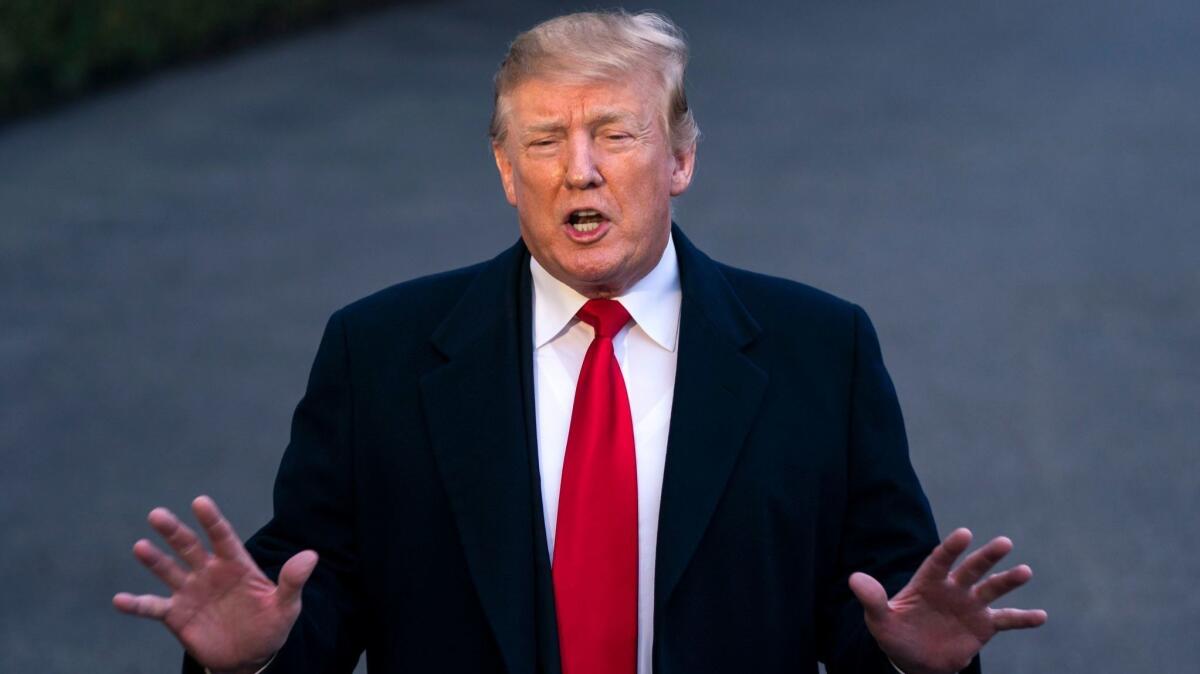Editorial: No, Mueller’s report is not a ‘total exoneration’ for Trump

- Share via
President Trump and his defenders are understandably exulting now that the Justice Department has released a summary of Special Counsel Robert S. Mueller III’s principal conclusions about his investigation of Russian interference in the U.S. presidential election. But, all too characteristically, the president is portraying Mueller’s findings as a “total exoneration.” It’s no such thing.
The summary of Mueller’s conclusions came in a letter Atty. Gen. William Barr sent to Congress Sunday. According to Barr, Mueller did not establish that the Trump campaign “conspired or coordinated with” the Russian government or a Russian “troll farm” in two notorious operations: the social-media disinformation campaign launched by the Internet Research Agency and the hacking of Democratic email accounts and the release of embarrassing emails via WikiLeaks.
Of course that’s a victory for the president. For that matter, it’s also good news for the country. Even Trump’s critics should welcome a finding that the president and his campaign officials didn’t break the law by conspiring with Russians to subvert the election.
But Trump wasn’t content to welcome this finding. On Twitter he suggested that Mueller’s message was “No Collusion, No Obstruction, Complete and Total EXONERATION.”
In fact, Mueller didn’t absolve the president of obstructing justice. Instead, according to Barr, Mueller “did not reach a conclusion — one way or the other” about whether actions by Trump constituted obstruction. Barr quoted Mueller as saying: “While this report does not conclude that the president committed a crime, it also does not exonerate him.”
Barr and Deputy Atty. Gen. Rod Rosenstein then made their own quick determination that the evidence that Mueller amassed over the course of a two-year investigation wasn’t enough to establish that Trump committed an obstruction-of-justice offense.
These contrasting perspectives, as well as a profusion of other as-yet unanswered questions, are a reminder that it is absolutely vital that Congress — and the public — be given access to Mueller’s complete report, with only minimal redactions to protect legitimate national security secrets.
That Mueller cleared the Trump campaign of colluding criminally with Russia doesn’t mean that his investigation was a wasteful “witch hunt” or that people in Trump’s orbit didn’t engage in questionable contacts with Russians, as Trump and his allies contend. The guilty pleas and convictions obtained by Mueller belie that.
And, of course, the end of Mueller’s investigation doesn’t mean that other investigations related to the Trump campaign — including those underway in the Southern District of New York and elsewhere — won’t uncover information about criminal activity by Trump or his aides.
The president is entitled to take satisfaction in some of what Mueller concluded. But Congress must not take Barr’s summary of Mueller’s conclusions as “total exoneration” of the president or a substitute for Congress’ own responsibility to investigate important matters. They include the president’s firing of former FBI director James B. Comey and Comey’s allegation that Trump pressured him to drop an investigation of former National Security Adviser Michael Flynn.
It isn’t second-guessing Mueller to insist that Congress and the public receive access to his complete report, not just the snippets that appeared in Barr’s letter.
And one other point. There is a long list of reasons why we think Trump is unfit for the presidency and dangerous for the country. The only thing we learned from Barr’s summary is that colluding with Russia is no longer on it.
Enter the Fray: First takes on the news of the minute »
Follow the Opinion section on Twitter @latimesopinion and Facebook
More to Read
A cure for the common opinion
Get thought-provoking perspectives with our weekly newsletter.
You may occasionally receive promotional content from the Los Angeles Times.






